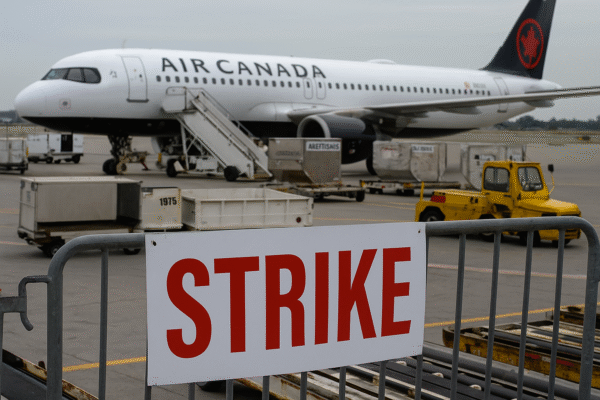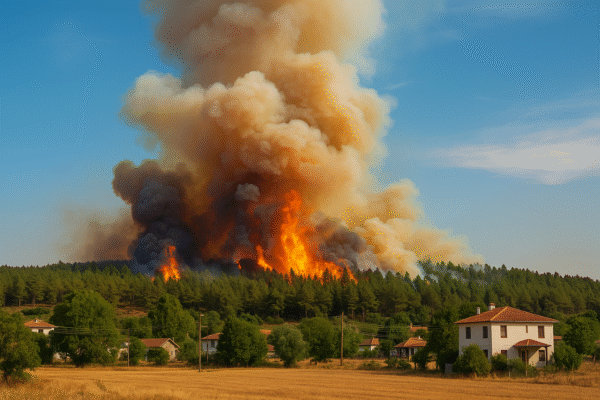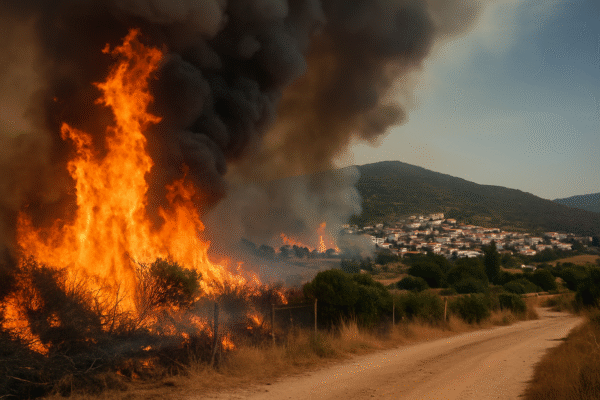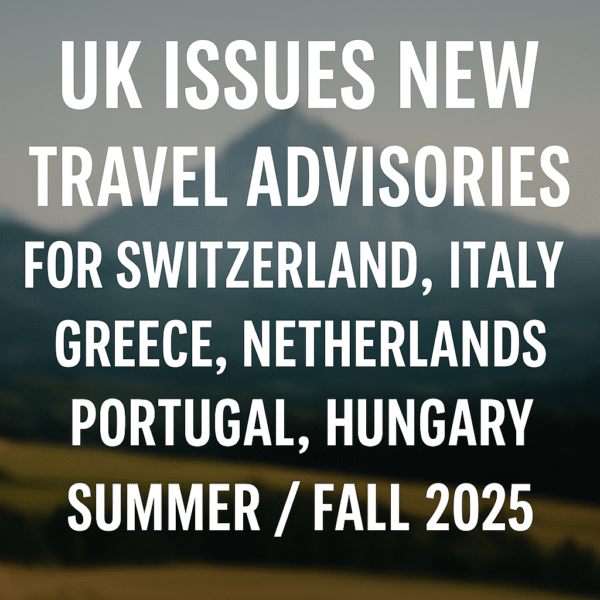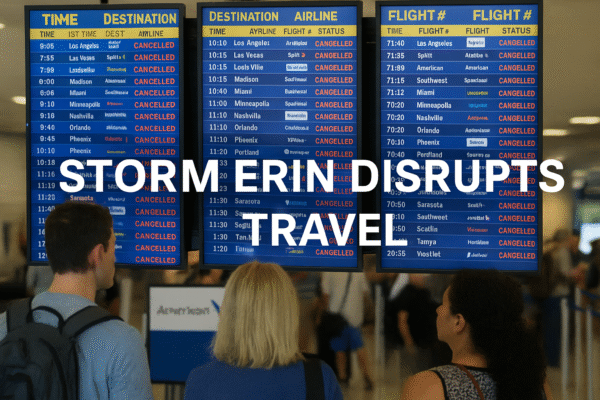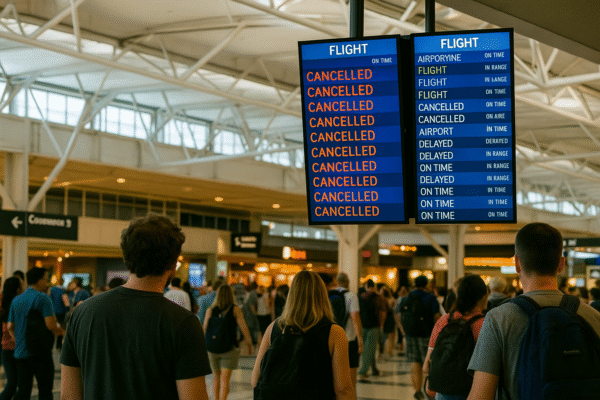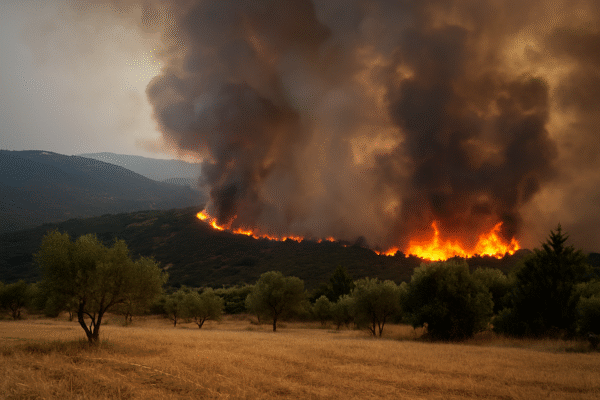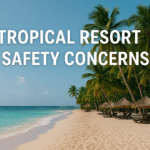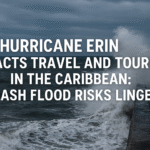LONDON, UK – August 16, 2025 — Wildfires have intensified across Southern Europe this summer, prompting urgent travel warnings from the UK Foreign, Commonwealth and Development Office (FCDO). UK tourists planning visits to Spain, Portugal, and Greece are strongly advised to monitor updates, avoid high-risk zones, and adjust travel plans accordingly.
Record-breaking temperatures, prolonged droughts, and high winds have ignited large-scale fires, leaving devastation across popular tourist regions. As of mid-August, over 575 square miles of land have burned in Spain alone, with additional hotspots in Portugal and Greece. Tragically, seven lives have been lost, with more than a thousand residents and travelers evacuated.
Spain Faces Historic Wildfire Outbreak
Spain is experiencing one of its worst wildfire seasons in over two decades. The regions of Castile and Leon, Galicia, Asturias, and Extremadura are among the hardest hit. Wildfires near the historic cities of Zamora and Orense have caused extensive damage, prompting road closures, train service suspensions, and state-level emergency responses.
Temperatures have soared above 44°C in central and southern parts of Spain, combining with strong gusts to exacerbate fire conditions. The Spanish Ministry for Ecological Transition has mobilized the UME (Military Emergency Unit) to assist firefighters and protect threatened towns.
Tourists are advised to avoid hiking trails, natural parks, and rural accommodations in affected regions. The UK FCDO’s travel advice for Spain has been updated to include safety notices and emergency contacts for British nationals.
Portugal Deploys Thousands of Firefighters Amid Growing Emergency
Neighboring Portugal is also battling catastrophic fires, especially in the Alentejo and Central Region, including Grandola and Leiria. Thousands of firefighters have been dispatched, and air support has been provided by the European Union Civil Protection Mechanism.
The Portuguese Civil Protection Authority issued red alerts for several districts. Popular destinations in the Algarve remain operational but are on high alert as temperatures remain elevated.
Evacuation orders have been issued in central towns where fires threaten residential and tourism zones. In addition to damaged properties and forest loss, Portugal is confronting power outages and water shortages in fire-stricken communities.
Tourists visiting Portugal are encouraged to check regional fire maps, carry valid ID at all times, and download the Proteção Civil mobile app for real-time alerts.
Greece Battles Wildfires in Islands and Mainland
In Greece, wildfires have been burning for days on the island of Chios, forcing evacuations of local villages and tourist accommodations. Emergency crews are also managing blazes near Athens and Central Greece, with several highways closed due to low visibility and fire threats.
Authorities from the Hellenic Fire Service warned of deteriorating air quality in Attica, advising those with respiratory issues to remain indoors and wear protective masks outdoors.
Smoke from ongoing fires has blanketed Athens and surrounding regions. The Greek Tourism Ministry has urged travelers to avoid excursions into dry woodlands, urging caution even in areas not directly affected by fires.
Wildfires and Tourism: Impact on Travel Plans
The wildfires come at the peak of the summer holiday season, disrupting travel itineraries for thousands of tourists across Europe. From canceled hiking trips in Spain’s Sierra de Gredos to closed beaches in parts of Portugal and evacuation alerts in Greek villages, the impact is widespread.
Airlines have begun rerouting flights due to visibility concerns, and some resorts have issued refunds or alternative bookings to affected guests.
The UK FCDO advises tourists to stay updated via official government websites, sign up for travel alerts, and ensure they have comprehensive travel insurance covering natural disasters.
Safety Tips for UK Tourists Traveling to Affected Areas
To minimize risk while traveling in fire-prone areas this summer:
- Avoid affected regions: Delay travel or reroute trips away from zones under red or orange fire alerts.
- Prepare for smoke: Use N95 or similar masks if smoke pollution is present. Limit outdoor activity.
- Stay mobile: Keep transportation accessible in case of evacuation orders. Don’t rely solely on public transport.
- Carry essentials: Pack water, power banks, travel documents, and a first aid kit.
- Check accommodations: Contact hotels in advance to confirm operations and safety status.
Climate Change and the Future of Mediterranean Tourism
The current fire crisis underscores the escalating impact of climate change on tourism. According to the European Environment Agency, rising global temperatures are making Southern Europe increasingly vulnerable to heatwaves and wildfires.
Spain’s environment minister has urged a “climate emergency response” to address the root causes of the growing disaster. Regional governments are calling for increased EU funding to bolster fire prevention, early detection systems, and forest management programs.
Tourism stakeholders are also evaluating long-term strategies, including seasonal shifts, sustainable tourism planning, and improved crisis communication.
Final Thoughts
As wildfires continue to rage across Southern Europe, travelers are urged to prioritize safety above all. The Mediterranean remains a top destination for UK tourists, but adapting to climate realities is now a necessity.
Check live fire maps, stay alert to government advisories, and choose safer destinations if possible. As heartbreaking as this crisis is, it serves as a powerful reminder: nature’s beauty must be respected—and protected.
For more travel news like this, keep reading Global Travel Wire




